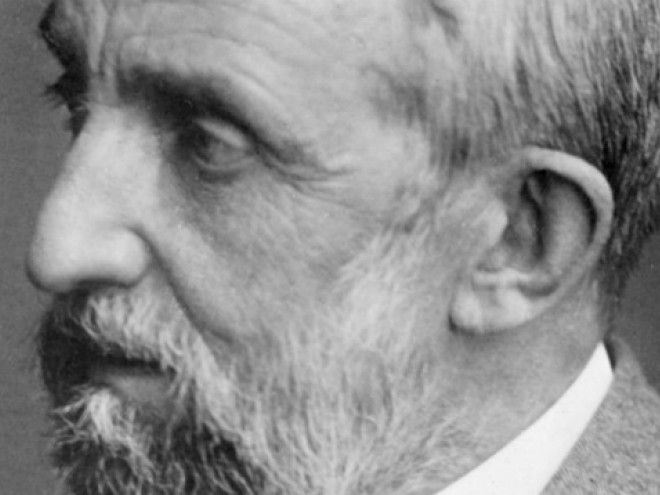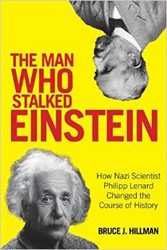Earlier this week, Bruce J. Hillman shared the story behind writing The Man Who Stalked Einstein and why Jewish doctors make great writers. He has been blogging here all week as part of the Visiting Scribe series on The ProsenPeople.
I know it’s unwholesome, but I am obsessed with the idea of an afterlife. It’s not something I think about every day or even once a week, but it is always is out there, residing on the edge of consciousness— “a riddle, wrapped in a mystery, inside an enigma,” as Winston Churchhill said. Unknowable. Untestable. Alien to my life as a scientist.
About ten years ago, I wrote a short story titled, “What Comes Next?” about a man who awakens in total darkness. He neither sees nor senses touch but intuits that he is confined in a very narrow space. Dimly at first, but with increasing clarity, he hears a mélange of recognizable voices — his rabbi, his wife, business partners, an illicit lover — relating perspectives that reflect the successes and failings of his life. Realizing that he is listening in on his own memorial service, he comes to believe that he lies at the doorstep of the afterlife. Per the title, he wonders what comes next? His mind runs wild with possibilities. In the end, however, the brief episode of postmortem consciousness turns out to be nothing more than a final pulse of neurotransmitters that, once exhausted, leaves nothing but darkness.
The doyens of my writing critique group uniformly panned “What Comes Next?” as unnecessarily morbid and pessimistic. No one, they predicted, would publish such a story. Their prophesies proved accurate. After having the story rejected by several obscure literary journals, I interred it in my electronic files, never, until now, to be dragged out and reconsidered.
So why did I dig this hoary chestnut from its cyber-resting place now? Recently, I sat with my wife Pam, her children and grandchildren, in a steeply canted university auditorium and listened to a performance of Messiah. Handel tends to get all the credit for this remarkable creation. However, the power of Handel’s music is abetted by the prophetic Old Testament passages chosen by Handel’s collaborator, Charles Jennens. Jennens’ selections complement handles soaring music to accentuate the central theme of Messiah—the coming of the Messiah, rebirth, and eternal life.
Like many Jews, I have had little instruction in these matters. Raised in a Conservative Jewish family, the conversations I heard at home and in synagogue were about this life. The emphasis was on living a good and righteous existence for its own sake with neither the promise of heavenly reward nor the threat of eternal punishment.
 Absorbed in the music and following Jennens’ libretto along with the choir, sufficiently absorbed by consciousness that I could suspend my usual disbelief. I asked myself: Why not an afterlife? If, in fact, there is a God, and He is active in the world, and He is truly omnipotent, as believers say, was there any reason to doubt that He could orchestrate even the most fantastical events: arranging for a leap to heaven for an overnight stay, dispatching an angel with new dictates inscribed on golden tablets, directing history towards a colossal end of times battle between good and evil…why not any of these? For that matter, why not all? Who can know the mind of God? Who can imagine the enormity of his plan?
Absorbed in the music and following Jennens’ libretto along with the choir, sufficiently absorbed by consciousness that I could suspend my usual disbelief. I asked myself: Why not an afterlife? If, in fact, there is a God, and He is active in the world, and He is truly omnipotent, as believers say, was there any reason to doubt that He could orchestrate even the most fantastical events: arranging for a leap to heaven for an overnight stay, dispatching an angel with new dictates inscribed on golden tablets, directing history towards a colossal end of times battle between good and evil…why not any of these? For that matter, why not all? Who can know the mind of God? Who can imagine the enormity of his plan?
The leap to faith in an activist God is the big bite of the apple. Once that chasm is crossed, fathoming an existence beyond our world of the senses is nothing more than a nibble.
Bruce Hillman is Professor of Radiology at the University of Virginia and Editor-in-Chief of the Journal of the American College of Radiology. He has published eight short stories and the 2010 book for lay readers, The Sorcerer’s Apprentice: How Medical Imaging is Changing Health Care.
Related Content:
- Journey to Heaven: Exploring Jewish Views of the Afterlife by Leila Leah Bronner
- The Zurau Aphorisms of Franz Kafka edited by Roberto Calasso; translated by Michael Hoffman and Geoffrey Brock
- Leigh Stein: The Diarist
Bruce Hillman is Professor of Radiology at the University of Virginia and Editor-in-Chief of the Journal of the American College of Radiology. He has published eight short stories and the 2010 book for lay readers, The Sorcerer’s Apprentice: How Medical Imaging is Changing Health Care. The Man Who Stalked Einstein is his first non-medical book.




